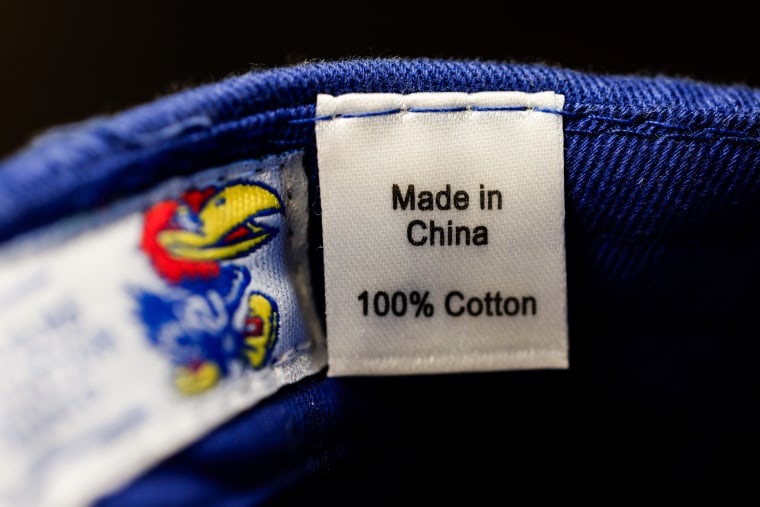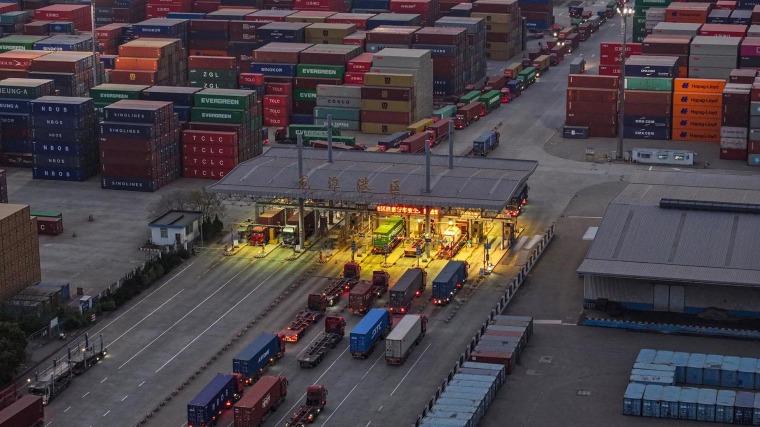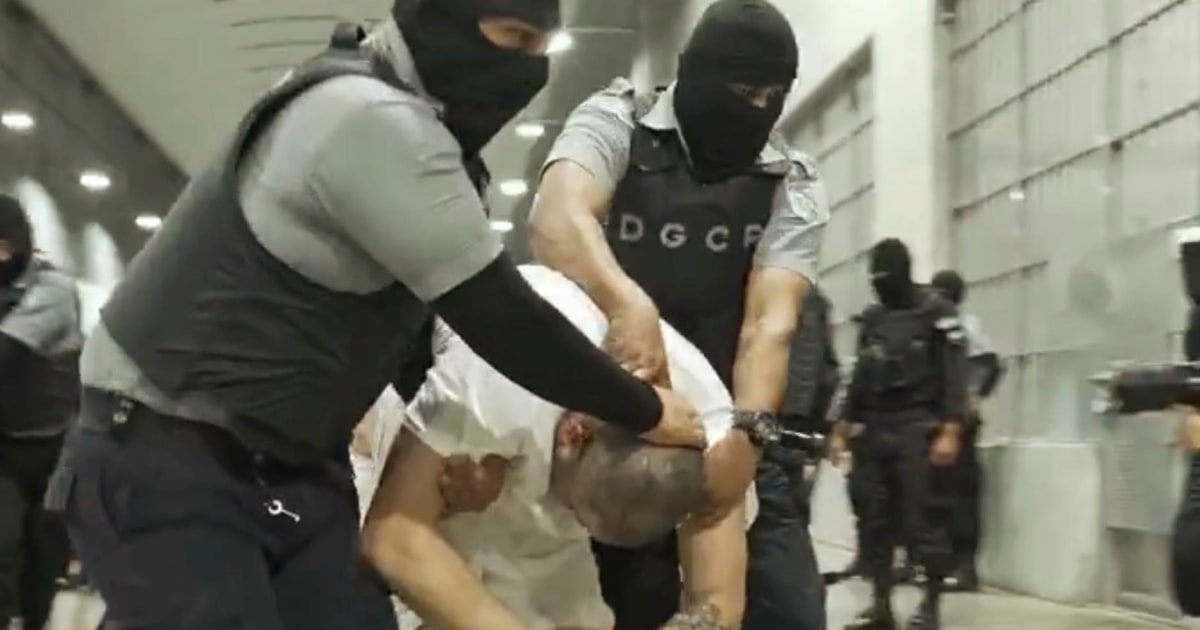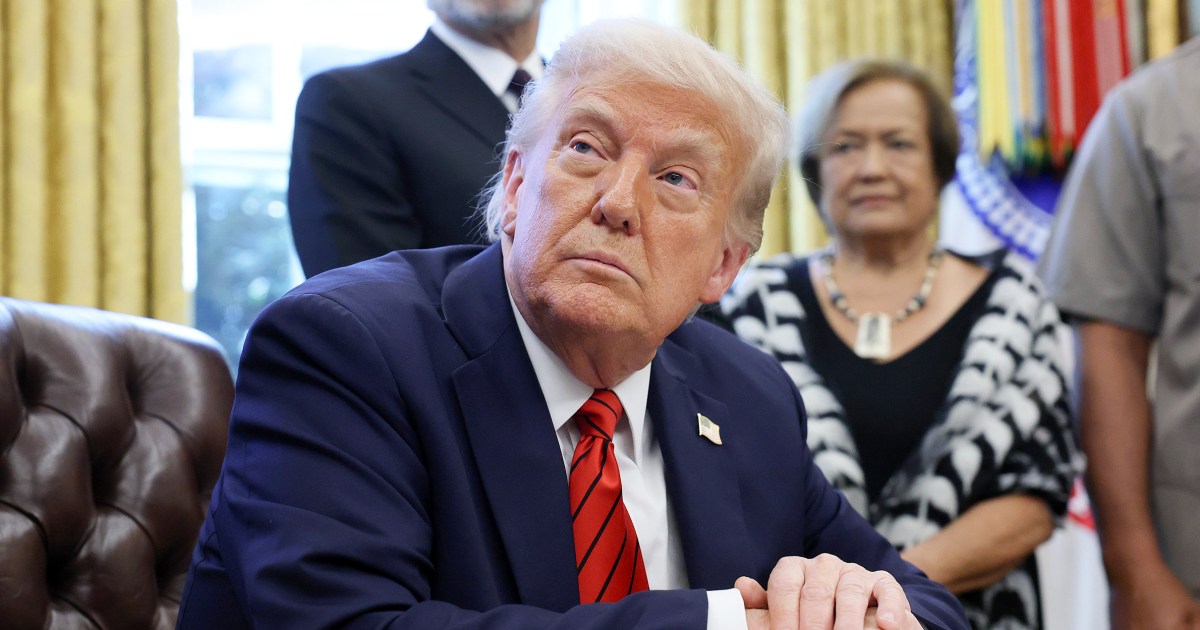LONDON — President Donald Trump has upended the global economy by slapping tariffs on the world, including its two largest exporters — China and the European Union. One has snapped back while the other appears to be taking a breath.
While Beijing has vowed to “fight to the end” of an increasingly ferocious trade war, the European Union has adopted a seemingly more methodical approach, only voting Wednesday for a response to the “unjustified and damaging” import taxes on steel and aluminum Trump announced in February.
While critics decry the E.U.’s lack of agility as the glacial response of a lumbering bureaucracy — and perhaps even a downside of democracy itself — supporters defend it as nuanced and long-termist.
The unspecified “countermeasures” announced Wednesday come into force April 15. But the bloc’s 27 member states are still deliberating how to react to the White House’s worldwide tariffs that have collapsed share prices over the past week, saying they favor negotiation over retribution.

China’s policies, meanwhile, are largely dictated by one man — President Xi Jinping — who has aggressively countered. Earlier Wednesday, Beijing ramped up retaliatory tariffs on all American goods to 84%, vowing to “fight to the end” in this mutually painful conflict.
“There isn’t one ‘right’ response to Trump’s tariffs,” said Pranesh Narayanan, a research fellow at the Institute for Public Policy Research, a London think tank. “Both China and the E.U. have a different set of goals, different geopolitical relationships with the U.S. and different decision-making processes.”
Trump describes both Beijing and Brussels as competitors — a departure from previous presidents who regarded the Europeans as trading partners, cultural and military allies, and friends. He has repeatedly and falsely exaggerated the trade deficits of both, warning retaliation will be met with even more extreme measures.
Some of Trump’s team are adamant this is policy, rather than a negotiating tactic; the president himself has suggested the opposite.
“These countries are calling us up, kissing my ass,” Trump said Tuesday at a dinner in Washington.
He has called on China to follow suit, writing in a Truth Social post Tuesday that “we are waiting for their call. It will happen!”
But there is little evidence that China plans to blink first.
Last week, it matched Trump’s new 34% tariff — and then went toe-to-toe Wednesday with the 50% hike the president said he would impose if China did not withdraw its first retaliation.
The Chinese Finance Ministry said Trump’s “escalation” was a “serious violation of China’s legitimate rights and interests, a serious damage to the rules-based multilateral trading system, and a serious impact on the stability of the global economic order.”
China is “hunkering down for a long period of trade tensions in the hopes they can outlast the U.S. side,” said Rick Waters, a former State Department diplomat who is now the Singapore-based director of Carnegie China.
“The Chinese are proud. They have a history of humiliation at the hands of foreign powers,” he said. “And I think those types of tactics play into their defensive instincts.”
In contrast to Xi’s rule, the E.U.’s 27 member states must agree on trade policy through a two-thirds majority.

That’s not easy now that Europe is laced with hard-right populists who have developed ties with Trump’s White House.
One of them is Italian Prime Minister Giorgia Meloni, who now has to balance her admiration for Trump with the pain his tariffs threaten for her country. She has advocated de-escalation to “prevent a trade war” ahead of her visit to Washington next week.
“It’s difficult to cajole a consensus,” said Paola Subacchi, an economics professor at the University of Bologna. “But all of these opinions are under the same umbrella of self-interest — each country wants to get the best for themselves.”
Subacchi is among those who believe that the E.U.’s consensus-based approach may actually be a strength. With most eyes on Beijing, whose tariffs are far higher than Europe’s, it has time to calibrate its reply.
Waiting a beat means “inflation will start to impact U.S. consumers, and the reality of Trump’s policies will start to materialize,” said Elvire Fabry, a senior researcher at the Jacques Delors Institute, a think tank partly funded by the E.U. and French government. “I think Europe could be in a better position to leverage and retaliate.”
For all their differences, the E.U. and China are now working together against Trump’s tariffs. European Commission President Ursula von der Leyen spoke Tuesday with Xi’s second-in-command, Premier Li Qiang. Some experts say this should alarm Trump.
“The fact that the administration came out against nearly 70 countries at once makes me worried that it may have actually improved China’s position,” Waters said. “Because now you have Europe and China talking to each other.”
Europe has in its arsenal the so-called “bazooka” — officially the Anti-Coercion Instrument — which is a framework allowing it to impose a range of punishments in response to “economic coercion.”
“The game the U.S. is playing, based on spurious analysis, data and economic understanding, is a very dangerous one,” Subacchi said.
“Whatever Trump and his advisers think, the United States receives a huge amount of capital inflows because foreign investors trust the dollar and trust U.S. treasuries,” she added. “As a result of this ‘Liberation Day,’ all of this confidence and trust is just melting.”








